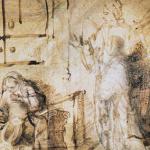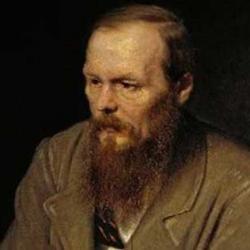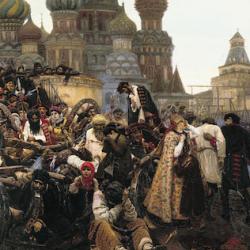Following the death of his first wife, Dostoevsky reflected on immortality, a meditation that led him into political musings on “socialism,” religious and secular.
His premise, exemplified in his own brutal treatment of his wife, is that Ego controls our lives. Christ’s commands lay out the path toward fulfillment, but we can’t keep those commandments. If there is no future life, we are condemned to be enslaved to Ego forever, and will never reach fulfillment. Dostoevsky cannot believe that human existence is so pointless, and thus he concludes that the clash between Ego and Christ provides proof of a future world.
In his own words: “the commands of Christ present a transcendent ideal toward which we strive even now. Christ alone could love man as himself, but Christ is a perpetual eternal ideal to which we all strive and, according to the law of nature, should strive. Since the appearance of Christ as the ideal of man in the flesh, it has become as clear as day that the highest use a man can make of his personality, of the full development of his Ego – is, as it were, to annihilate the Ego, to give it totally and to everyone undividedly and unselfishly. All are responsible for all – that is the law of Christ. The law of the Ego fuses with the law of humanism, and in this fusion both the Ego and the all mutually annihilate themselves one for the other, and at the same time each attains separately, and to the highest degree, their own individual development.”
He concludes: “if there is no afterlife, then there would be no one to enjoy the fulfillment of this process. It is completely senseless to attain such a great goal if upon attaining it everything is extinguished and disappears, that is, if man will no longer have life when he attains the goal. Consequently, there is a future paradisial life.”
He goes on to say that “this is my social ideal, my ‘socialism,’ if you will.” Socialism in this sense means the reconciliation of individual and society, the turning of Ego into the way of Christ.
Dostoevsky writes, “I often imagine a dialogue between the individual and society. The individual tells society, ‘I give myself to you,’ meaning that he offers his talents, powers, loves and hates to the rest of society to serve others. He sacrifices for society. But then I imagine that society responds with ‘I give myself to you.’ Society gives all its resources, powers, gifts to serve the individual, so that the individual can be fulfilled. Each gives itself wholly and totally to the other. And this is the imitation of Christ and at the same time the highest realization of man. It is the fusion of Ego and self-sacrifice, of individual and society. The Paradise of Christ is this fusion, and this is the goal toward which all history, whether of humanity in part or of each man separately, is only the development, struggle, and attainment.”
This was the basis of his eventual critique of secular socialism: “They want the Paradise of Christ without Christ himself. They want that paradise now, here, and not in an afterlife. But, this is my point, it is only with an afterlife that we can attain this goal. Man on earth and in time will not achieve this fusion. Man on earth is only a creature in development, not finished but transitional.”











